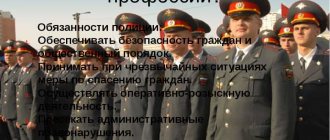- November 10, 2018
- Guides
- Sergey Korotchenko
Often, most citizens ask the question, what is an official? Who holds senior management positions? How are these people different from ordinary workers? All these and many other questions are answered by the Code of Administrative Relations or, to put it legally correctly, the Code of Administrative Offenses (hereinafter referred to as the Administrative Offenses Code). So, let's look at all these questions, and also find out the status, responsibilities and rights of officials.
Concept
By combining the legislative and economic specifics of Russia, we can answer the question, what is an official? He is a citizen of a country who performs tasks representing the authority of the state. However, power may not be state power. A person holding a certain position can obtain this status as a boss, director or leader of a company, party or institution. In any case, all tasks performed by a person cover all processes of the administrative, management and business cycle of the company.
In the current realities, one can answer the question “what is an official” in different ways? The Civil Code of the Russian Federation states about the legal relations of a citizen, the Criminal Code of the Russian Federation indicates criminal liability. The administrative responsibility of officials is reflected in the Administrative Code. But if we consider this category within the framework of the representation of the authorities of the Russian Federation, then this is a government body.
Authorized authorities
Which officials have the right to decide cases of administrative offenses? It all depends on the severity of the violation of the law. So, it is worth paying attention to the following authorities:
- customs and tax authorities, military registration and enlistment offices, border services;
- ATS;
- executive agencies;
- collegiate administrative commissions;
- commissions for minors;
- magistrates, as well as judges from district and regional courts.
Civil servants in Russia are divided into federal and regional. The Parliament, the Government and the President operate at the federal level. At the regional level - the highest official of the constituent entity of the Russian Federation, regional authorities and courts.
An official as a guarantor of the protection of citizens
The Code on Administrative Relations fully describes who is an official. Based on the law, the vesting of powers in the prescribed manner defines a person as an official. A person has citizens under his command and disposes of them within the framework of his functions and tasks.
Performing functions of an economic, administrative, administrative and managerial nature, these persons carry out their tasks within the framework of such areas as:
- regional and state institutions;
- Russian Armed Forces;
- local government.
All persons with authority bear administrative, civil and criminal liability for the implementation and failure to implement certain measures to achieve the assigned tasks.
Status as a right to action
Who is an official under the law? You can answer only by indicating the status of the official. All this is possible through the assigned powers and scope of activity. It is important to consider that status does not affect the assigned tasks and assigned functions.
A person in authority may exercise entrusted rights or refrain from executing them. At the same time, the responsibilities remain inseparable. That is, in this area there is equality between the dispositive and imperative principles of legal practice. On an administrative basis, there is a possibility of refusal from public and private activities related to the powers of the official. But in the criminal field, a person has the right to exercise only public competencies.
Government representatives: classification
As noted above, the concept of an official in criminal law provides for the presence of such a component as a representative of the authorities. That is, it includes people who are competent to carry out the functions of the judicial, representative and legislative authorities. This also includes employees of any law enforcement agencies or bodies exercising control and supervision. The main feature is the right to make decisions, the implementation of which is mandatory not only for those who are subordinate to the official, but also for all citizens, regardless of whether they work in a particular structure or not.
The representative of the authorities is the first of two types of officials in criminal law. The second is a person who has special powers or various functions described below.
Let us give examples of officials: these are deputies of Parliament, the State Duma, the Federation Council, also these are deputies of legislative bodies at the subject level, members of the Government at all levels, judges, both magistrates and federal.
Administrative law as law for an official
The Code of Administrative Offenses has its own types of liability for legal entities and officials. For a citizen, for the most part, punishments are applied for failure to fulfill or incorrect fulfillment of assigned competencies.
Administrative responsibility of officials extends to all areas of activity. Often, a citizen is punished according to criminal law. In this criminal law, an official is characterized by an object that, on a permanent basis or for a limited period, fulfills the competence of a representative of public authority. The 30th chapter of the Criminal Code of the Russian Federation is devoted to this aspect.
Administrative rule-making in this regard gives much more and deeper understanding to the official. The subject of an offense is a person who has committed a violation in the area of his competence. And these are not always directors and heads of departments, but also ordinary employees of the government apparatus who perform managerial, organizational and supervisory functions.
Sanctions for offenses
Are there any special types of sanctions for officials? The Russian Administrative Code states that imposing punishment on an organization does not exempt officials from liability. The most common type of punishment for such citizens is an administrative fine and disqualification.
In the latter case, we are talking about deprivation of the opportunity to hold a professional position for a period determined by the court. A simple example is the highest official of a constituent entity of the Russian Federation. The governor, head of the republic, district or any other region may be dismissed for any offense. Sometimes disqualification may coincide with lustration - but only in cases of change of power throughout the country.
Ratio of ordinary and officials
According to the law, it can be understood that an official acts as a representative of a government body, as well as certain categories of ordinary employees. And in this understanding, disagreement arises; it is not entirely clear what difference these two understandings bear between each other.
Based on the law on administrative legal relations, the category of official is determined by persons who work in government and related structures, performing a set of managerial powers. Plus, all this can be attributed to ordinary persons who carry out business activities, i.e. individual entrepreneurs or traditional individual entrepreneurs. And against the background of this comparison, a number of disputes and questions arise about what belongs to what, and who is responsible for what.
At first glance, owning a business under a legally registered individual entrepreneurship seems far from the usual understanding of what an official is. All activities of an individual entrepreneur are aimed at making a profit, and by their nature are more similar to the organization of a legal entity. However, the reasons for violations, the nature of actions and motives can indicate the individuality of an individual entrepreneur in comparison with a legal entity or official. This pattern is not accidental. Over the past few years, the government has increasingly pushed back the boundaries of identifying an official and an individual entrepreneur. And practice shows that the liability of an individual entrepreneur is formed with a guarantor for his own business. All this does not pass without changes, thereby changing and adjusting laws and regulations. So, for example, violation of the issues of use of land property for individual entrepreneurs will be regarded as a category of legal force with subsequent fines and punishments.
Violation of rights by officials
One part of the Administrative Code contains more than 400 points. Of which, more than 300 reflect the subject of the official’s responsibility. Most of the articles reflect aspects of business and management. It is worth highlighting some areas in which this issue is regulated:
- Management control (in Chapter 19, 19 articles).
- Infringement of civil rights (50 articles in Chapter 5).
- Control of military support (in Chapter 21 there are 4 articles).
- Protection of property (in Chapter 7, 29 articles).
- Customs area (in Chapter 16 there are 21 articles).
- Ensuring environmental protection and environmental management (Chapter 8 contains 38 articles).
- Information technology and communications (Chapter 13, 23 articles).
- Business, taxes and finance (59 articles in chapters 14 and 15).
- Animal husbandry and agriculture (14 articles in Chapter 10).
- Attempt on state authorities (in Chapter 17, 10 articles).
- Energy (in Chapter 9 there are 14 articles).
As a result, we get a whole range of measures for the responsibility of civil servants, which reflect almost all possible areas of human activity.
Organizational and administrative powers
The second structural link of the concept of an official in criminal law is the performance of various functions; we will analyze them in more detail.
This category includes people who manage the team of the government at any level or other people who are directly subordinate. At the same time, organizational functions involve resolving personnel issues, determining labor functions, imposing penalties for violation of discipline, and so on. This will include making decisions that have legal implications and consequences. For example, issuing a certificate of temporary or permanent disability, establishing the fact of disability and determining its degree, grading an exam.
For example, a school director, the rector of an institute, the head of an institution, medical or social service workers.
Preventive measures
Considering all the spheres of influence that an official influences, we must not forget about the legal punishments present in Russian practice. For example, the application of certain sanctions to an organization is directly transferred to the official through disqualification or an administrative fine.
Usually the fine is commensurate with the official salary, i.e., according to the number of salaries, and disqualification is deprivation of the right to occupy an appointed position for a certain period by court decision. An example of such positions could be senior officials of the Government, regions or districts, as well as municipal officials.
Administrative and economic competencies
The concept of an official in criminal law has a multifaceted meaning; we have revealed only two aspects. Let's move on to the third, which also includes the execution of functions. Administrative and economic activities include the distribution of property, money in any form, making decisions on the amount and period for calculating wages, vacation payments, and benefits. All actions that are aimed at controlling the movement of property, valuables or money belong to this type of authority.
Vivid examples would be warehouse managers, accountants, heads of scholarship and financial departments, heads of bases, etc.
An official as an example from life
Based on the legal status, determining the official is a difficult task. All regulatory documents lack clear distinctions between types of professions. It follows from this that everything needs to be considered using an example from life.
Often, most people, when getting a job at an enterprise, cannot determine their affiliation with the official. For such gradation and determination of status, it is necessary to refer to the responsibilities and rights of the new employee. Let's take the janitor for example. And here the question arises: can an employee with such a position have the status of an official? And in fact, it can, if during the application for a job he signs a document on financial responsibility. In such a situation, the employee has the authority to dispose of the allocated goods depending on his discretion and to solve his problems. This practice is quite rare, but sometimes the employer himself delegates some of his functions to others, thereby focusing on larger-scale tasks. How this affects the enterprise in the future is a matter of time. However, we must not forget about the special type of responsibility that an employee also receives with the acquisition of this status. And this directly imposes sanctions if violations of the entire enterprise are committed.
Pros and cons of officials
The rights and obligations of officials are the inalienable pros and cons of the entire legal status of such citizens. After all, issues of holding these individuals accountable should be narrated on behalf of these citizens. The structure of government bodies is built on the principle of protecting the ruling system and combating the lack of legitimate thought. The main function of the entire system is a reasoned, legitimate, fair prosecution of the violator according to the law. As part of this process, state representatives who are officials are identified and competencies are vested.
In Russia, more than a hundred regulatory authorities deal with administrative violations. For example, internal affairs bodies count more than 50 types of such violations, ranging from the field of road traffic to the protection of law and order. In these structures, the officials are heads of departments and their deputies. They also submit for consideration all violations regarding part of the regulatory norms.
Main points
An official is considered to be a person with entrusted responsibilities to a representative of management or government authorities. The exercise of accepted powers occurs permanently, within the framework of specific powers or temporarily.
This administrative unit is present in the following organizations:
- local elected bodies;
- military formations of the Russian Federation;
- municipal institutions;
- state-owned companies;
- business companies, the share of voting shares of which is owned by domestic organizations.
The legal interpretation of this term and the peculiarities of its legal status are a pressing issue for many citizens.
The interpretation of “official” is so voluminous that it is sometimes difficult to identify the main characteristics
Functions of an official
The functionality of this category of persons is determined by the issues facing them and the name of the structure in which they work.
Table 1. Main functions of an official
| Administrative and economic | Organizational and administrative |
| 1. Management of property and assets on the balance sheet. 2. Inspection of material assets 3. Consideration of issues regarding the amount of remuneration for services provided. | 1. Control of labor discipline. 2. Team management. 3. Preparation of legal documents. Issuing sick leave, for example. 4. Formation of personnel. 5. Compilation of characteristics of members of the state examination commission. 6. Taking disciplinary action. 7. Organization of working conditions. 8. Establishment of a medical examination to establish disability. |
The official interacts with a wide range of people, many of whom are not directly subordinate to him
Functions of officials
It is better to consider the functional responsibilities of various types of officials using an example. Thus, ATS cover a significant part of all functions in the field of warning and prevention of violations. Cases under such circumstances as alcohol intoxication in a public place, hooliganism, non-compliance with traffic rules and regulations, regulations at the state border, etc. are being studied.
The Department of Internal Affairs covers many areas of the life of the population, but it is not omnipotent. It is important to note that if an official attempts an illegal action or inaction, he or she can also be identified and punished by the relevant law enforcement agencies.
Steps to success
An elected official must have a good sense of foresight, the ability to control a situation, understand fairness, and promote safety. The official must have all the positive characteristics of a policeman, lawyer, judge, accountant, reporter, athlete and diplomat. They also act as those who can be empowered and take responsibility without having power. All this is possible thanks to a number of steps:
- always be competent on issues and important decisions;
- be prepared for surprises and force majeure circumstances;
- remember the promises made;
- be able to take into account risks and legal costs;
- be cultural regardless of the situation.
By studying, observing and applying all these steps, the leader as an official will always be respected and have great potential for career growth.








